- Home
- Tony Hillerman
Skinwalkers jlajc-7 Page 16
Skinwalkers jlajc-7 Read online
Page 16
The cat was watching him from the hillside above its juniper. It had been in sight much of the morning, vanishing down the bank of the San Juan for a while but returning after less than an hour to lie in the juniper's shade. Chee had put the shipping case under the tree the previous evening—fitting it beneath the limbs as near to the cat's sleeping place as he could force it. In it he'd put an old denim jacket, which the cat sometimes sat on when it came into the trailer. He had added, as lure, a hamburger patty from his refrigerator. He'd been saving the patty for some future lunch, but the edges had curled and turned dark. This morning he noticed the meat was missing and he presumed the cat had gone into the case to retrieve it. But he could see no sign that the cat had slept there. No problem. Chee was patient.
The case was really a cage with a carrying handle and had cost Chee almost forty dollars with taxes. It had been Janet Pete's idea. He had brought up the problem of cat and coyote as they left the Turquoise Cafe, trying to extend the conversation—to think of something to say that would prevent Miss Pete from getting into her clean white official Chevy sedan and leaving him standing there on the sidewalk.
"I don't guess you'd know anything about cats?" Chee had said, and she'd said, "Not much, but what's the problem?" And he'd told her about the cat and the coyote. Then he'd waited a moment while she thought about it. While he waited (Janet Pete leaning, gracefully, against her Chevy, frowning, lower lip caught between her teeth, taking the problem seriously), he thought about what Mary Landon would have said. Mary would have asked who owned the cat. Mary would have said, Well, silly, just bring the cat in, and keep it in your trailer until the coyote goes away and hunts something else. Perfectly good solutions for a belagana cat in a belagana world, but they overlooked the nature of Jim Chee, a Navajo, and the role of animals in Dine' Bike'yah, where Corn Beetle and Bluebird and Badger received equal billing when the Holy People emerged into this Earth Surface World.
"I don't guess you'd want a cat," Janet Pete said, looking at Chee.
Chee grinned.
"Can you fix up something out there? So the coyote can't get to it?"
"You know coyotes," Chee said.
Janet Pete smiled, looked wry, brightened. "I know," she said. "Get one of those airline shipping cages." She described one, cat-sized, with her hands. "They're tough. A coyote couldn't get her in that."
"I don't know," Chee said, doubting the cat would get into such a thing. Doubting it would foil a coyote. "I don't think I've ever seen one. Where can you get 'em? Airport?"
"Pet store," Janet Pete said. And she'd driven him to the one in Farmington. The shipping cage Chee eventually bought had been designed for a small dog. It was made of stiff steel wire that looked coyote-proof. And it was large enough, in Chee's opinion, to seem hospitable to the cat. Janet Pete had remembered an appointment and hurried him back to his car at the courthouse.
Even as he was driving to Shiprock with the cage on the seat beside him it was seeming less and less of a good idea. He'd have to narrow the doorway to make it just big enough for the cat and too small for the coyote's head. That looked simple enough In fact, it had been merely a matter of using some hay baling wire. But there was still the question of whether the cat would accept it as a bedroom, and whether she would be smart enough to recognize the safety it offered when the coyote was stalking her.
Chee thought about that as he swept up the sand, using the feathered wand from his jish bundle for the task. After she had created the first of the Navajo clans, Changing Woman had taught them how to perform their curing ceremonials. She'd made the first dry paintings out of the clouds, blowing each away with her breath as its purpose was completed. And she'd taught the first of the Navajos to scatter their painting sand to the winds, just as Chee did now—collecting it on a dustpan and then throwing it into the air to drift away. He brushed the last traces of the picture away and collected the coffee cans in which he kept his supply of unused sands. No use thinking about the cat now. Time would tell. Perhaps the cat would use the cage. If it didn't, there would be the time to seek another solution. And there were other, tougher problems. How would she fare when she grew big with pregnancy? How would the litter survive? Worse, she was hunting less now—or seemed to be. Relying more on the food he provided her. That was exactly what he couldn't allow to happen. If the cat was to make the transition—from someone's property to self-sufficient predator—it couldn't rely on him, or on any person. To do so was to fail. Chee had been surprised when he first realized that he cared how this struggle ended. Now he accepted it. He wanted the cat to tear itself free. He wanted belagana cat to become natural cat. He wanted the cat to endure.
Chee stacked the cans of sand back into the outside storage compartment in the wall of his trailer, where he kept all his ceremonial regalia. He would take with him, he decided, his jish just in case the circumstances at his meeting with Alice Yazzie required some sort of blessing. Besides, the jish case itself and the ceremonial items in it were impressive. In this, Chee was a perfectionist. His prayer sticks were painted exactly right, waxed, polished, with exactly the right feathers attached as they should be attached. The bag that held his pollen was soft doeskin; labeled plastic prescription bottles held the fragments of mica, abalone shell, and the other "hard jewels" his profession required. And his Four Mountain bundle—four tiny bags contained in a doeskin sack—included exactly the proper herbs and minerals, which Chee had collected from the four sacred mountains exactly as the yei had instructed. Chee would take his jish. He would hope that the opportunity would arise to get it out and open it.
Inside the trailer, he exchanged his dusty jeans for a pair he'd just bought in Farmington. He put on the red-and-white shirt he saved for special occasions, his polished "go-to-town" boots, and his black felt hat. Then he checked himself in the mirror over his washbasin. All right, he thought. Better if he looked a lot older. The Dinee liked their yataalii to be old and wise—men like Frank Sam Nakai, his mother's brother. "Don't worry about it," Frank Sam Nakai had told him. "All the famous singers started when they were young. Hosteen Klah started when he was young. Frank Mitchell started when he was young. I started when I was young. Just pay attention and try to learn."
Now, finally, he would be beginning to use what Frank Sam Nakai had been teaching him for so many years. As he drove up the slope away from the river, he noticed that the cloud formation that built every afternoon over the slopes behind Shiprock was bigger today, dark at the bottom, forming its anvil top of ice crystals earlier than usual in this dry summer. Howard Morgan, the weatherman on Channel 7, had said there was a 30 percent chance of rain in the Four Corners today. That was the best odds of the summer so far. Morgan said the summer monsoon might finally be coming. Rain. That would be the perfect omen. And Morgan was often right.
When he turned west on 504, it looked as if Morgan was right again. Thunderheads had merged over the Carrizo range, forming a blue-black wall that extended westward far into Arizona. The afternoon sun lit their tops, already towering high enough to be blowing ice crystals into the jet stream winds. By the time he turned south beyond Dennehotso across Greasewood Flats, he was driving in cloud shadow. Proximity winds were kicking up occasional dust devils. But Chee had been raised with the desert dweller's conditioning to avoid disappointment.
He allowed himself to think a while about rain, sweeping its cool, wet blessing across the desert, but not to expect it. And now he needed to think of something else. The Badwater Clinic was over the next ridge.
The quirky wind generated by the thunderstorms' great updrafts bounced a tumbleweed across the unpaved clinic parking lot just as he pulled his truck to a stop. He turned off the engine and waited for the gust to subside. The place had been built only five or so years ago—a long one-story, flat-roofed rectangle set in a cluster of attendant buildings. A cube of concrete housing the clinic's water well was just behind the building, surmounted by a once-white storage tank. Beyond that stood a cluster of those ugly f
rame-and-brown-plaster housing units that the Bureau of Indian Affairs had scattered by the thousands across Indian reservations from Point Barrow to the Pagago Reservation. New as the clinic compound was, the reservation had already touched it, as it seemed to touch all such unnatural shapes imposed upon it, with an instant look of disrepair. The white paint of the clinic building was no longer white, and blowing sand had stripped patches of it from the concrete-block walls. None of this registered on the consciousness of Chee, who, Navajo fashion, had looked at the setting and not the structures. It was a good place. Beautiful. A long view down the valley toward the cliffs that rose above Chilchinbito Canyon and Long Flat Wash, toward the massive shape of Black Mesa—its dark green turned a cool blue by cloud shadow and distance. The view lifted Chee's spirits. He felt exultant—a mood he hadn't enjoyed since reading Mary Landon's letter. He walked toward the clinic entrance, feeling a gust of sand blown against his ankles and guessing that today it would finally rain and he would be lucky.
He was. The person sitting behind the counter-desk in the entrance foyer was the Woman from the Yoo'l Dinee, the Bead People. Chee's excellent Navajo-trained memory also produced her name—Eleanor Billie. She had been the receptionist on duty that cold late-spring day when he had come with the Onesalt woman to collect the wrong Begay. Her memory seemed to be as good as Chee's.
"Mister Policeman," she said, smiling very slightly. "Who can we get for you today? Do you need another Begay?"
"I just need you to help me understand something," Chee said. "About the time we got the wrong one."
Mrs. Billie had nothing to say to that. That smile, Chee realized, had not been a warm one. Maybe he wasn't so lucky.
"What I need to know is whether the woman who was with me—that woman from Window Rock—if she ever contacted anybody about that. Wrote a letter. Telephoned. Anything like that. Did she have any questions? Who would I ask about that?"
Mrs. Billie looked surprised. She produced an ironic chuckle. "She raised hell," she said. "She came in here the next day and acted real nasty. Wanted to see Dr. Yellowhorse. I don't know how she acted with him. She acted nasty with me."
"She came back?" Chee laughed. "I guess I shouldn't act surprised. She was mad enough to kill somebody." He laughed again. Mrs. Billie smiled, and now, he noticed, it seemed genuine. In fact, it was spreading into a broad grin.
"I always wondered what happened. To get that bitch in such a rage," Mrs. Billie said.
"Well, we took Begay to the chapter house over at Lukachukai. They were having a meeting—trying to settle whether a family from the Weaver Clan or an outfit from the Many Hogans Dinee had a right to live on some land over there. Anyway, Irma Onesalt had found out that this old Begay man had lived over there for about a thousand years and he was supposed to tell the council that the Many Hogans family had lived there first, and had the grazing and the water and all that. I didn't see all of it, but what I heard was that when they called on that Begay you gave us to talk about it, he gave them this long speech about how he never had lived there at all. He was born to the Coyote Pass People, and born for the Monster People, and him and his outfit lived way over east on the Checkerboard Reservation."
Chee was grinning as he finished, remembering Irma Onesalt's incoherent rage as she stomped out of the chapter house and back to his patrol car. "You should have heard what she said to me," he said. What Irma Onesalt had said would translate precisely from Navajo to English. It was the equivalent of: "You stupid son-of-a-bitch, you got the wrong Begay."
Mrs. Billie's grin showed an array of very white teeth in a very round face.
"I'd like to have seen that," Mrs. Billie said, with Chee now firmly established as a fellow victim. "You should have heard what she said to me. I just reminded her she'd called and said she was picking up Frank Begay to take him to the hearing, and we gave her the only Begay we had. Franklin Begay. Pretty damn close."
"Pretty close," Chee agreed.
"And the only Begay we had," Mrs. Billie said. "Still is, for that matter."
"Wonder what caused her to get the wrong name—or whatever happened."
"Oh, Frank Begay used to be here. He was diabetic, with all sorts of complications. But he died way back in the winter. Earlier than that. It was in October. He was the one from Lukachukai."
"I wonder if that's what caused the confusion," Chee said. "She didn't seem like a woman who'd get confused much."
Mrs. Billie nodded, agreeing. She looked thoughtful. "What she said was that we had our records all screwed up. Said we had him on our list as a patient. I looked, and told her we didn't. And she said, Damn it, yes we did. Maybe not today, she said, but a couple of weeks ago." Mrs. Billie was showing her white teeth in another joyful grin, remembering. "That's why I know just when Frank Begay died. October three. I went back into the files and found it."
Chee allowed himself to imagine for a moment how much pleasure Mrs. Billie had attained by giving that news to Irma Onesalt. He remembered his own discomfort at the chapter house, with the woman leaning on the door of his patrol car, staring at him contemptuously, bombarding him with questions about why he had delivered Franklin Begay when she had told him to deliver Frank Begay. An unusually arrogant woman, Irma Onesalt. He wondered, half seriously, if Dilly Streib, or whoever was working her homicide for the FBI, had considered that as a motive for her murder. Someone might simply have got tired of suffering Irma Onesalt's bad conduct.
"What else did Onesalt say?" Chee asked.
"Wanted to see the doctor to argue about it."
"Dr. Yellowhorse?"
"Yeah. So I sent her on in."
Yellowhorse and Onesalt, Chee thought. Two tough coyotes. For different reasons, he didn't like either of them—but Yellowhorse he respected. His differences with the doctor were purely philosophical—the believer and the agnostic exploiting the belief. Onesalt was, or had been, simply an obnoxious jerk. "I wish I could have seen those two," Chee said. "What happened?"
Mrs. Billie shrugged. "She went in. Maybe five minutes she came out."
The telephone at Mrs. Billie's plump elbow buzzed. "Badwater Clinic," she said. "What? Okay. I'll tell him." She hung up. "Came out steaming," she continued, grinning again. "Pure rage now. The doctor, he can be rough, you get him stirred up."
Chee was remembering what Janet Pete had told him—of Irma Onesalt's remark about the wrong Begay business tipping her off to something. This conversation hadn't opened any doors to what that might be. Or had it?
"She say anything else? Any remarks or anything?"
"No," Mrs. Billie said. "Well, not much. She got almost to the door and then she turned around and came back and asked me what that date was when Frank Begay died."
"You told her October third?"
"No. I hadn't looked it up yet. I told her last fall, I guess. And then she asked me if she could see a list of the patients we had in here." Mrs. Billie's face expressed disapproval of this remembered outrage. "Imagine that kind of brass!" she said. "And I said she'd have to ask the doctor about that and she said to hell with it then, she'd get it another way." Mrs. Billie looked even more disapproving. "Actually she said a little worse than that. Rough-talking woman."
A middle-aged black woman in a nurse's uniform came down the hall with a young Navajo who was pushing a wheelchair. The wheelchair contained a woman with her leg in a cast. "Now tell her again that it will itch, but she's not supposed to scratch it. Just let it itch. Think about something else." The Navajo said, "Don't scratch," in Navajo, and Woman in Cast said, in English, "Don't scratch. You told me that before."
"She speaks English," Mrs. Billie told the nurse. "Better than I do."
"That was it? Nothing else?" Chee asked, getting Mrs. Billie's attention again.
"Just walked out after that," Mrs. Billie said.
"She said she could get the list of patients another way?"
"Yeah," Mrs. Billie said. "I guess she could, too. They'd all be on some sort of medical-cost reim
bursement list. Medicare, or Medicaid, or some insurance claim if they had insurance. Most of them wouldn't."
"Just have to go through the red tape?"
"Probably no big deal. She worked in Window Rock with all the other bureaucrats. Probably just get somebody in the right accounting office to get her a Xerox, or let her take a peek."
Chee had been remembering Leaphorn in his trailer, putting the list on his countertop. Leaphorn watching his face as he looked at the list. Leaphorn asking if he knew any of them. Looking disappointed when he didn't. Asking if the names suggested anything to him. They had suggested nothing. But now they did. Now they seemed terribly important.
"I haven't got any friends among the bureaucrats at Window Rock. Any way I could find out who was here that day?"
"You could ask Dr. Yellowhorse."
"Good," Chee said. "Can I get in to see him?"
"He's not here," Mrs. Billie said.
Chee looked as disappointed as possible. He shrugged, made a wry face.
"You're a policeman. I guess you could say it was police business."
"It's police business," Chee said.
"It will take a while," Mrs. Billie said, getting up. "Call me if the telephone rings."
It took about ten minutes and the telephone didn't ring. "I just copied them off for that date," Mrs. Billie said. "I hope you can read my writing."
Mrs. Billie's writing was a beautiful, clear, symmetrical script—a script that would win penmanship competitions, if there were still penmanship competitions. Chee noticed that before he looked at the names.

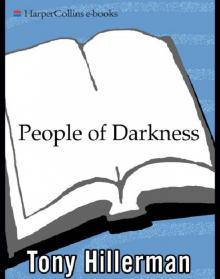 People of Darkness
People of Darkness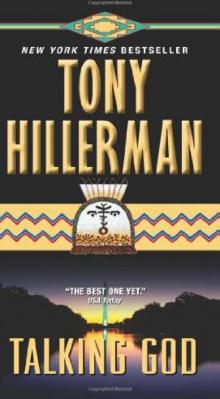 Talking God jlajc-9
Talking God jlajc-9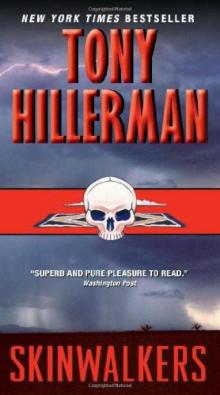 Skinwalkers jlajc-7
Skinwalkers jlajc-7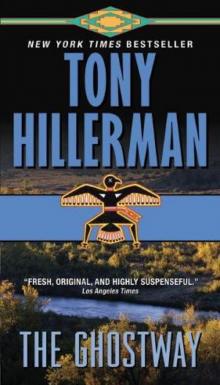 The Ghostway jlajc-6
The Ghostway jlajc-6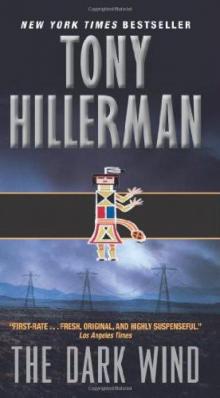 The Dark Wind jlajc-5
The Dark Wind jlajc-5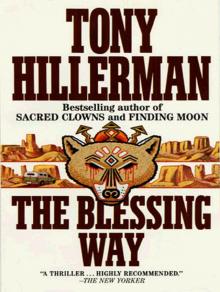 The Blessing Way
The Blessing Way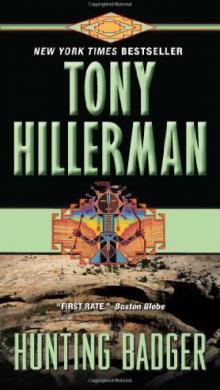 Hunting Badger jlajc-14
Hunting Badger jlajc-14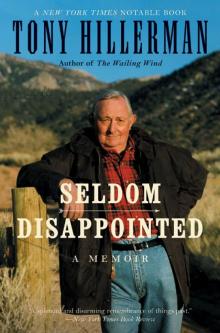 Seldom Disappointed: A Memoir
Seldom Disappointed: A Memoir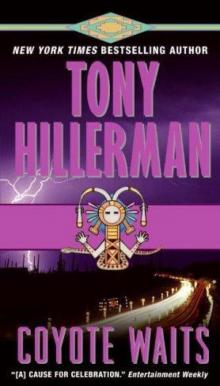 Coyote Waits jlajc-10
Coyote Waits jlajc-10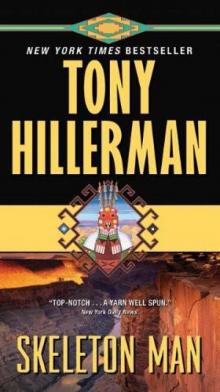 Skeleton Man jlajc-17
Skeleton Man jlajc-17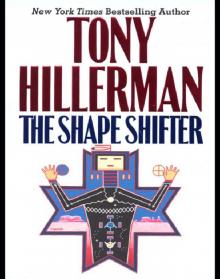 The Shape Shifter
The Shape Shifter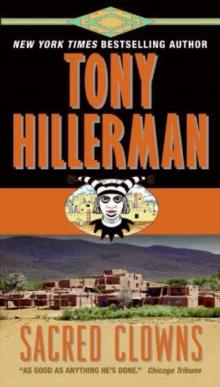 Sacred Clowns jlajc-11
Sacred Clowns jlajc-11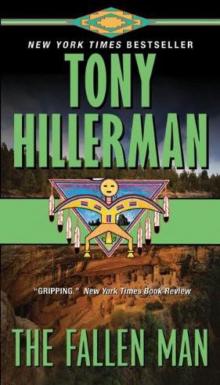 The Fallen Man jlajc-12
The Fallen Man jlajc-12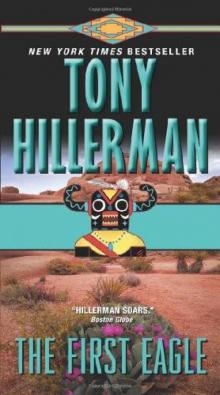 The First Eagle jlajc-13
The First Eagle jlajc-13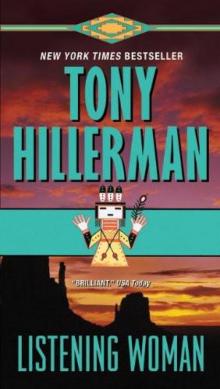 Listening Woman jlajc-3
Listening Woman jlajc-3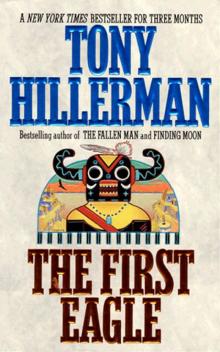 The First Eagle
The First Eagle Skeleton Man
Skeleton Man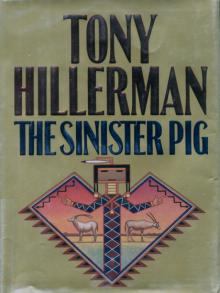 The Sinister Pig jlajc-16
The Sinister Pig jlajc-16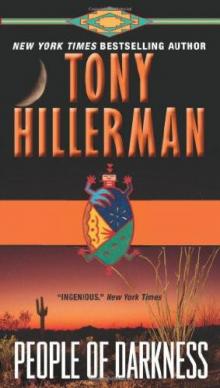 People of Darkness jlajc-4
People of Darkness jlajc-4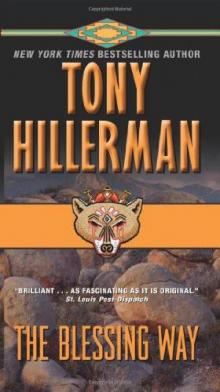 The Blessing Way jlajc-1
The Blessing Way jlajc-1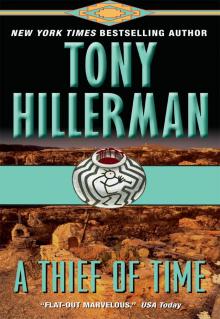 A Thief of Time
A Thief of Time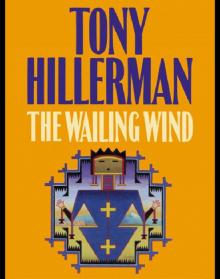 The Wailing Wind
The Wailing Wind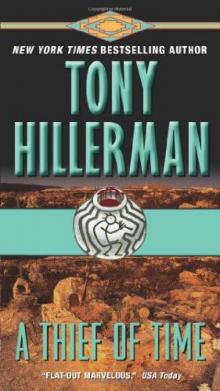 A Thief of Time jlajc-8
A Thief of Time jlajc-8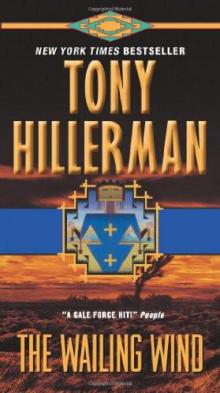 The Wailing Wind jlajc-15
The Wailing Wind jlajc-15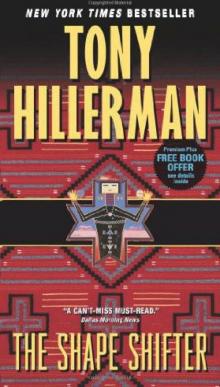 The Shape Shifter jlajc-18
The Shape Shifter jlajc-18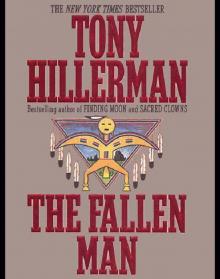 The Fallen Man
The Fallen Man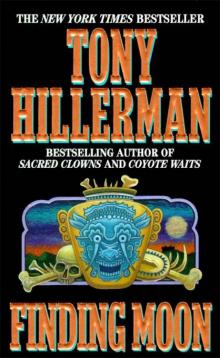 Finding Moon
Finding Moon